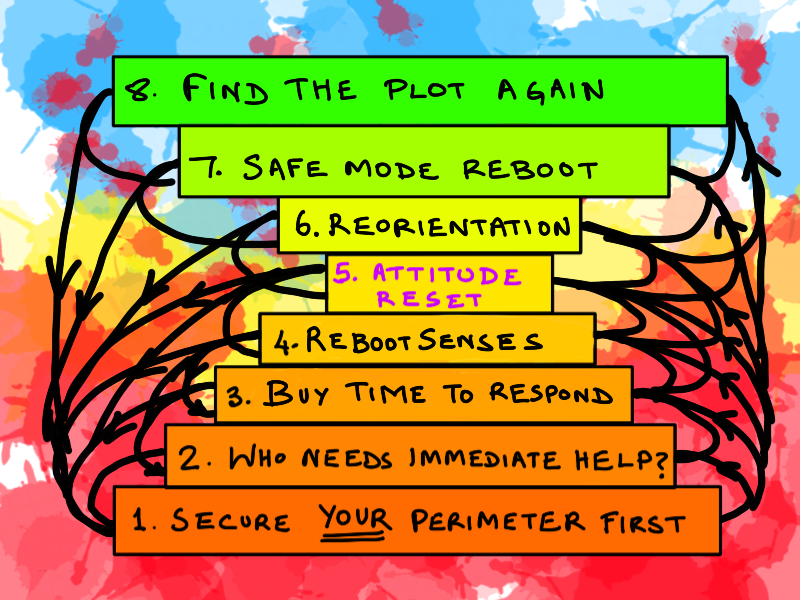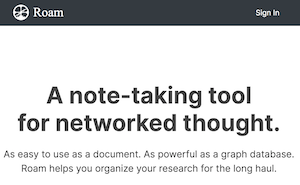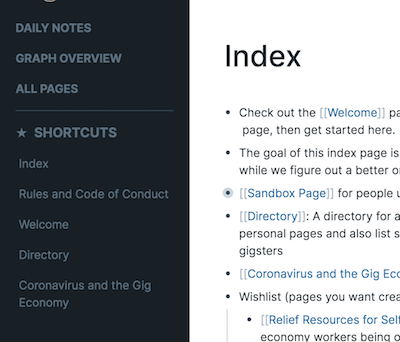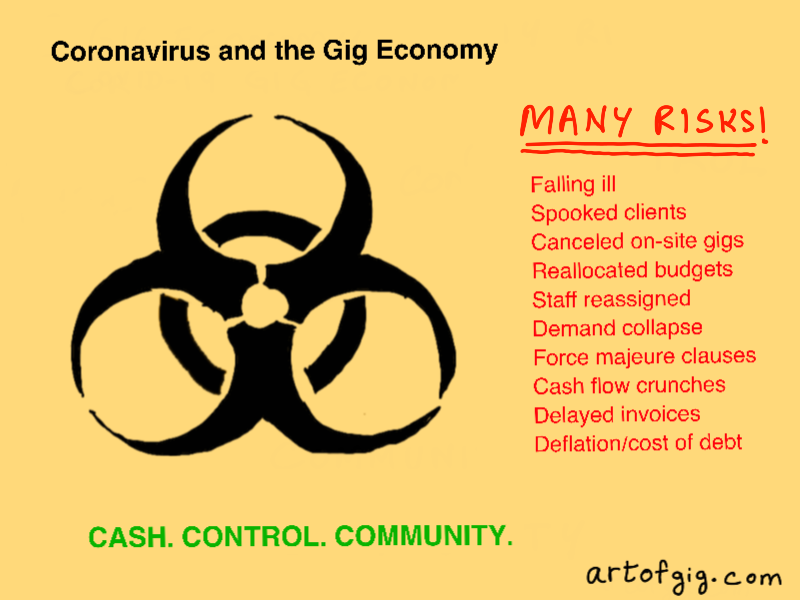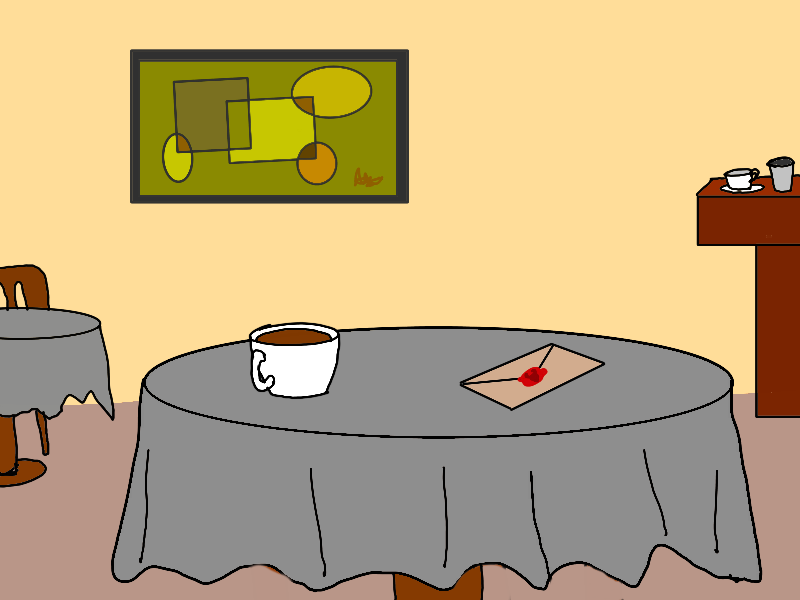The COVID-19 carnage in the economy continues, as governments around the world desperately seek palliative measures. Measures which, despite their record-setting enormity, still don’t seem up to the challenge. The job loss numbers reported this morning in the US are staggering: 3.28 million people have applied for unemployment benefits in the last week. That’s almost 12 times the previous week, and about 4x the previous historical high. Vast numbers of people are joining the Involuntary Gig Economy under conditions of extreme financial distress as we speak. All the fiscal resources being marshaled seem set to be exhausted within months given the current rate of depletion.
Make no mistake: this is already really ugly and set to get much uglier. If you’re tempted to let your guard down, don’t. The first wave of news has passed, but the crisis itself is just getting started.
I’m trying to create the simplest kinds of scaffolding I can think of, but not too simple, to help me meaningfully navigate. Here is a fairly general crisis roadmap diagram I came up with, which I’ll apply to the gig economy in a minute.
Crisis Roadmap
I’m a big believer in keeping crisis response models as brain-dead simple as possible, and getting them down to checklist-level simplicity. The diagram above is my first attempt.
Right now, I think we all have to navigate a set of levels converging to a bottleneck I’ve labeled attitude reset. Once you get through the attitude reset bottleneck — a challenge that is more emotional than intellectual — you can start to think expansively, reorient, and find the plot again.
How does this work in the gig economy? Here’s my own journey so far:
-
Secure perimeter: Besides the obvious material preparations (stock up on essential supplies, restage your home for work, position your hand sanitizer bottles and masks) I mean the economic perimeter. In my case, I got my tax docs out to my CPA, closed my books for FY 2019, and updated my state awareness of my business/financial condition. Then I sent out invoices for billable hours I’d been procrastinating on, so I’ll be zeroing out accounts receivable soon and strengthening cash position soon. Despite the looming financial urgency, I made sure to get a decent contribution into my retirement portfolio, to be prepared for good investment opportunities.
-
Who needs immediate help? I’m fairly useless in this particular sort of crisis, but I did manage to rustle up a bunch of N95 masks to send to my niece, who’s an anesthesiologist at a hospital that isn’t supplying the staff with enough PPE. I also did a spot of pro bono consulting for some folks trying to pull a large-scale nonprofit response together. I am temperamentally unsuited to this sort of community-spirited, civic-minded general helpfulness, but there are times when you have to play to the needs of the situation rather than your strengths or preferences. This is one of those times. I’m reserving some bandwidth for this sort of thing. If you think I can help on some front, ask.
-
Buy time to respond: Luckily, I have a couple of months of my fellowship left to go. To buy more time, I launched my Breaking Smart newsletter (which I’d originally planned to do in May) two months early. That’s already bought me a month and beefed up my recurring revenue flow. I’m still shopping around for ways to buy more time. My goal is to lock down enough cash flow to see me through summer. I’m about halfway there. The second half is going to be a bitch. I’m expecting a sudden freeze-out in the short term.
-
Reboot senses: In OODA loop theory, a classic sign of an adversary getting inside your OODA loop is your senses getting cut off from external reality, so you start going nuts. This virus has literally done that to us, confining a lot of us to our homes, cutting us off from each other and the larger world. Take stock and recalibrate/re-establish your signal sources. Otherwise you risk responding to your own psychotic imaginings or garbage noise from sensors rendered newly useless. Without clean, relevant signals driving situation awareness, your psyche will collapse.
-
Attitude Reset: There is a LOT to respond to. Tons and tons of information, of varying quality and clarity, all jumbled up. The temptation is to respond immediately with a frenzy of activity. I think this is a mistake. Besides the basic triage responses in 1-4, it is better to take a step back and first clearly identify the attitude you want to adopt. What is your posture here? Aggressive? Fearful? Opportunistic? Altruistic? Selfish? Conservative? Risk-taking? Why? This is what I’m working on right now for myself.
-
Reorientation: Once I have my attitude reset, I expect to do my brainstorms, draw my mind-maps, model the situation better, and begin reorienting my OODA loop. I’m not there yet. Neither are you. If you think you are, you’re lying to yourself. Don’t get smug or complacent just because your preparedness level made your initial responses better than average. That just bought you a head start of a few weeks in what will be months, possibly years, of risk and uncertainty.
-
Safe-Mode Reboot: It seems hard to imagine now, but there will come a time when you will go from reactive to proactive, and start to seize the initiative once more. I expect to do so in a safe-mode first, since this is going to be a dangerous and unstable situation for a while. I think this will be around June/July for me.
-
Find the plot again: This is not the end of the world. It’s a terrible situation, but it’s not the end of the world. There’s an “other side” to this thing, even if it a permanently weird condition rather than a new normal. Right now, I think the other side is around 18 months away for most people. But there will be people who find the plot as soon as 6 months from now, and those who are destroyed by this to the point that they never recover the plot. Let’s all plan to be in the 6 month cohort, rather than the 18 month cohort, or god forbid, the never cohort.
Note the way I’ve drawn this diagram, with a bottleneck at Level 5. I think that’s a key feature of effective crisis responses. You have to converge on an effective posture while working through your triage actions, and then expand from there into a new mode of effective agency that goes beyond triage, into a new reality.
Another key is that there is no linear progress up the stack, you’ll be doing dizzying amounts of looping through the levels, as the arrows illustrate. Prepare to be a bit of a whirling dervish through this thing. Getting to a higher level doesn’t mean lower levels have been stabilized and can be ignored. It just means you have reoriented enough to handle more levels in parallel.
That’s not an intellectual condition. It’s an energy flow condition, which is almost synonymous with cash flow for the gig economy.
You’re not reoriented when you have a clever diagram representing your situation. You’re reoriented when you’re removing entropy from the situation faster than events are adding it, which will show up as a strengthening position and more agency. Gaining ground rather than losing it. For us in the gig economy, this pretty much means accelerating cash flow.
It’s not going to be quick, and it’s not going to be easy, but most of the world will make it through.
Not everybody will make it — 20,000 odd people are already dead, and nearly half a million infected. Those numbers might end up an order of magnitude higher by the time we’re done. And that’s just the first-order victims of the virus itself (which might include some of us). Victims of the economic carnage will number at least an order of magnitude higher than wherever the dead/infected number lands (and this will definitely include a lot of us in the gig economy).
I am under no illusions. By the time we’re done, many members of this list will have had their lives deeply affected. But let’s see if we in the gig economy, despite being outside the reach of most safety nets, can generate the resourcefulness to be first out the other end, as the vanguard entering the new reality we’re headed for.
